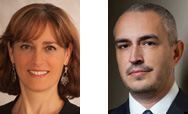The
State Bar’s best kept secret: Lawyer Referral Services
By
Carole Conn and Seth Chavez
 |
| Conn Chavez |
With
an extremely diverse array of marketing opportunities available to lawyers in
California, many are opting for an old favorite to source clients and build
business: Lawyer Referral Services (LRS).
The
first LRS programs in California appeared in the 1930s and 40s. Today, LRS
programs operate throughout the state, typically by county, referring cases in
every practice area. Regulated by the State Bar of California, LRS groups
provide key business building opportunities for lawyers and support the critical
access to justice efforts of local bar associations.
LRS
certainly isn’t for every lawyer, but it may also be a “best-kept secret.”
According to State Bar data, in 2014 there were nearly 6,000 lawyers
participating in LRS programs throughout the state. In 2014, California
certified lawyer referral services referred over 150,000 cases. At two of the
larger LRS programs in California, Los Angeles and San Francisco, some lawyers rely
exclusively on LRS to generate new business, while others use LRS to augment
other business-building efforts. Participating lawyers in at least one
California LRS program have collectively billed more than $10 million in
attorney’s fees each year over recent years and some LRS programs have secured
a number of seven-figure settlements on behalf of referred clients.
As
California lawyers attempt to navigate marketing options and avenues to
generate more and better quality leads, LRS programs appear to be gaining
momentum with lawyers in California. A recent Daily Journal article noted that
between 2007 and 2014, there was a 17 percent increase in the number of lawyers
participating. Increased use of LRS could be due to LRS groups reducing law
firm marketing costs, as well as reducing intake costs by screening clients in
advance and placing cases with the right participants based on types of legal
issues, location, client’s ability to pay, language spoken and many other
criteria.
LRS
programs provide another service to lawyers by offering a safe referral for a
potential client. The LRS network is 52 programs strong throughout California,
with most counties covered. As such, there is likely a lawyer referral program
nearby to send clients who may need assistance with a matter outside a lawyer’s
practice area. Because certification by the State Bar mandates adherence to
meticulous qualification standards, oversight and monitoring of client
representation and insurance requirements for participating members, lawyers
who refer clients to certified lawyer referral services are putting the client
in the capable hands of trained intake staff and vetted attorneys.
Additionally,
LRS intake teams are very knowledgeable about the wealth of legal resources in
their county, including free legal services programs, when it is determined
that the client’s needs are better served through an appropriate agency or
community-based nonprofit. LRS programs refer to local legal agencies, legal
clinics, low-cost and pro bono services, community based nonprofits,
governmental agencies and social services to best direct clients to the
information they need.
Whether
a lawyer has a few years of experience or is more senior, LRS programs can be a
great asset, either for the reward of providing a public service and sourcing
new clientele or as a reliable, trusted partner for referrals to experienced
attorneys and helpful legal resources. For more information, see the bar’s consumer pamphlet online.
Carole
Conn is director of public service programs at the Bar Association of San
Francisco and Seth Chavez is the director of the Los Angeles County Bar
Association’s Lawyer Referral Service.